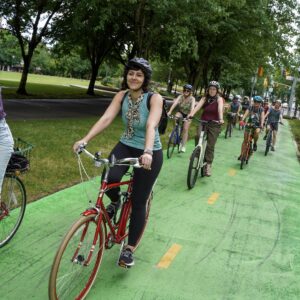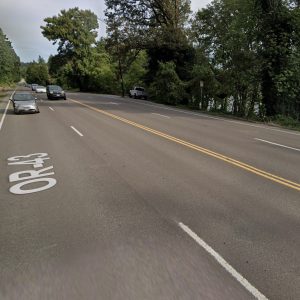We all know the failing, old, Sellwood Bridge is a major broken link in our transportation network. Or, as the BTA puts it:
“The Sellwood Bridge has extremely dangerous and inadequate bicycle and pedestrian facilities (a single 4-foot sidewalk on one side only)….the BTA has determined that the Sellwood Bridge is the major barrier to bicycling in the Portland region.”
Now, Multnomah County (they own the bridge) wants to hear from us about it. They’ve just released a survey asking for input on various alignment and facility alternatives.

This is a key part of the their process. Emily Gardner, the BTA’s policy advocate, has some specific advice:
- Questions 14 and 15: if a 4-lane cross-section is chosen, it will look and operate much like the Ross Island Bridge (as opposed to a human-scale bridge like the Hawthorne Bridge). Please support options that either limit the number of lanes, or that reserve additional lanes for transit purposes.
Questions 16 and 17: support ALL options (bike lanes, sidewalks AND multi-use path).
This is an important opportunity to shape this process and make the new Sellwood Bridge a safe, convenient and efficient crossing for everyone.
Take the survey now, and tell your friends to do the same.







Thanks for reading.
BikePortland has served this community with independent community journalism since 2005. We rely on subscriptions from readers like you to survive. Your financial support is vital in keeping this valuable resource alive and well.
Please subscribe today to strengthen and expand our work.
Thanks for passing this along.
Please take the survey, folks. Please consider leaving a comment at the end emphasizing the need for accommodation of bicycles, pedestrians, and public transit on the bridge.
If you have 3rd party cookies blocked, the survey won’t work. The site is sellwoodbridge.org but the survey site is surveymonkey.com. Since I block 3rd party cookies (as they are a privacy risk) they site does not work.
However, you can use the direct link to the survey – http://www.surveymonkey.com/s.asp?u=167293496805 so that you can take the survey without having to change your privacy settings.
In the comments portion at the end of the survey I added my 2 cents regarding design for pedestrians and bicycles. I really believe an ideal design would be one similar to the design of the Steel Bridge where the walkway/bikeway is hung off of the bottom of the bridge structure completely away from traffic. The path(s) could connect directly off of the Springwater Trail on the east side which is below the roadway and deposit peds and bicyclists away from congested Macadam Ave on the west side.
Anyone have any thoughts or comments about this idea??
ideal design would be… hung off of the bottom of the bridge structure completely away from traffic
Well, that works because the Steel Bridge is a draw bridge. 🙂 Not sure there’s budget to build and operate a lift-span.
That’s a totally false distinction, if you look at the current Sellwood bridge there’s a catwalk underneath the entire thing and obviously it’s not a lift span bridge. So imagine that but a bike/ped path.
What I put in the comment section was a request to not have to cross any lanes of traffic to get onto the bridge by bike (unlike the Hawthorne going east).
I’m on the Citizen’s Task Force, representing the watersports and river users interests. There are also representatives for bicycles/BTA and the Willamette Pedestrian Coalition on the 20-person CTF. I know the bike rep. reads this site, and Jessica Roberts, a frequent commentor here,is on the consulting team…so what gets posted here does get considered by the project team.
The County is developing alternatives for review in an EIS that include either a new bridge or rehabilitating the existing bridge. No decision on the rehab vs. replace issue has been made at this point.
In response to Hilsy’s comment, yes…that concept is currently part of the array of options currently on the table. Primarily for “rehab” options, as the width of the bridge deck is severely limited under rehab options.
For “new bridge,” a variety of concepts for sidewalks, in-roadway bike lanes, and separated bike/walking pathways, in any and all combinations, are being explored. There may be curbs or other separations (for example, Reed Market Rd/Bill Healy Bridge in Bend as an idea), but the general concepts have everything within a single-level cross-section.
Several folks on the Citizen’s Task Force have expressed concerns that the bike/ped path below the roadway and out of sight could be an attraction for criminal or other undesirable behavior.
I encourage folks to come to the open house on April 4th, 7pm, at Sellwood Middle School, where there will be lots of information on potential alignments, lane configurations, westside intersection/interchange, and connections to the paths on both sides of the river.
“…the BTA has determined that the Sellwood Bridge is the major barrier to bicycling in the Portland region.”
The Sellwood Bridge is definitely a major barrier to cycling in Portland, but not -THE- major barrier. Fixing the Sellwood Bridge would be so lovely though.
Another option that is not shown is rehabbing the existing bridge for bicycles and pedestrians and building a new, parallel bridge for motorized vehicles and transit. This could achieve some of the advantages of a separated bike/ped path that Hilsy points out.
Laura thanks for chiming in. I wonder if the people on the committee that fear crime on a lower level have ever been on the Steel Bridge bike/ped path. It’s just not a crime ridden place.
Why not put bikes/peds on TOP of the cars instead of a catwalk beneath? A little more climbing to get there but the view would be better [from many aspects…]. This might also allow it to be more open to thwart that criminal/undesirable behavior.
Also, the bridge to bike path connections on the west side of the bridge are important. Currently it is very difficult to get from the bridge to the cemetery – an important way to get from the bridge into southwest Portland.
Whatever is built or rehabed will have improved bike/ped facilities of some kind…can’t be worse. The key issue for all of us is the push by some interests for a new bridge with 4 traffic lanes. This would confirm Tacoma as a commute/freight route and would be a hammer to the head for folks in Sellwood who have been working so hard over the years to reclaim their Mainstreet for all modes.
Any new or rebuilt structure must have no more than the existing two traffic lanes.
I want a ferry boat.
Slick – The Steel Bridge path is uncovered. Part of the concern, and it’s been raised by several cyclists and runners, is that the Sellwood catwalk would create a covered space that might become a campsite and/or crimespot, like under the Hawthorne, parts of the MLK viaduct, and even the west-end bike loop off the Sellwood.
Lenny – thanks for chiming in about the Tacoma Mainstreet. One of the “ground rules” is that the Tacoma Mainstreet Plan, and the current configuration of Tacoma, will remain “as is.”
anp wrote:
“Another option that is not shown is rehabbing the existing bridge for bicycles and pedestrians and building a new, parallel bridge for motorized vehicles and transit. This could achieve some of the advantages of a separated bike/ped path that Hilsy points out.”
I suggested this in a post here a few months back; the old bridge is just about the ideal size for a bike/ped bridge. But someone replied to the effect that there’s not enough room on the shore to funnel car traffic from a new bridge and bikes from another. If so, darn.
Laura – Why not use a design similar to the Steel Bridge’s and make the bike/ped catwalk “uncovered” rather than directly below the roadway?
Brettoo- All of the alignments currently on the table start on Tacoma street at roughly 6th. There are 3 potential westside endpoints, each with pros and cons in terms of impacts. It appears that some of the alignment options could allow the existing bridge to remain as the ped-bike facility.
Hilsy – interesting idea…
I know there is a lot of sentiment that the path on the Steel is too narrow for a shared use path. For a new Sellwood Bridge, we’re looking at a design standard minimum of 16 feet with 20 feet desired.
I’m only speculating here, as I’m not a structural or civil engineer. I believe the issue for rehab is what can be “hung off” the existing bridge structure is severely weight-limited.
Information presented to the CTF shows that a 14′ path could fit in the existing catwalk area. Alternatively, 10′ could be added to each side of the top deck for ped/bike use (using lightweight paving materials that could not accommodate motor vehicles).
We haven’t really talked about a bi-level structure for use in alternatives for a new bridge.
Both of you: Please…suggest it on your reply to the survey. I can try and remember to ask the engineers at our next meeting, or you can ask at the open house on April 4.
I agree with John — a ferry should be considered as the most cost-effective option to provide cross-river access at that location during the construction period. It would be a lot cheaper to purchase a couple of ferries and operate them for the duration of construction, than to build a whole new temporary bridge structure.
Also, I voted for 2 vehicle lanes with 2 additional bus/streetcar lanes, 2 bike lanes, and 2 12-foot sidewalks — if a new bridge is chosen. Howzat?
Having ridden across that bridge several times, am I the only one to notice that the bridge itself is the least of problems for a cyclist?? The real problem is getting onto or off the bridge from the west side, especially if you are headed southbound on 43.